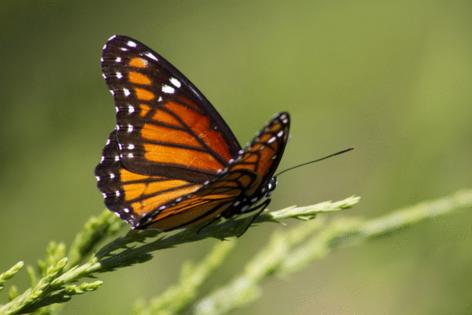Commentary: The vegan butterfly effect
Published in Op Eds
They say that when a butterfly flaps their wings, it can change the weather on the other side of the world. But what happens when butterflies die out?
The number of butterflies in the U.S. has declined by around 22% since 2000, according to a new study published in the journal Science. This dwindling number is evident in every part of the country and across many species.
The good news? We each have the power to help butterflies by ditching planet-killing meat, eggs and dairy. So this Earth Day (April 22), let’s save butterflies and other animals — by going vegan.
Butterflies are born to change. They start off small, always hungry, growing fast — then vanish into themselves, dissolve completely and reappear as someone new. They spend their adult lives following the sun and finding nectar.
But raising and killing animals for food destroys the forests, grasslands and wetlands that animals like butterflies need to survive. Farmers often clear these areas to create pastures and grow massive crops like soy and corn — often not for human consumption but for cows, chickens, pigs and other animals raised for food.
Plus, the widespread use of pesticides in corn and soy production is linked to the decline of monarch butterflies due to killing milkweed. A global shift to vegan eating could free 240 million acres of farmland and provide critical habitat for butterflies. And that’s just in the U.S.
Animal agriculture uses 80% of global farmland but provides only 17% of the world’s calories. According to research from the University of Oxford, shifting to a vegan food system could reduce global farmland use by 75%.
Animal agriculture also fuels the climate catastrophe, worsening the conditions that threaten butterflies. Methane emissions from cows’ digestive systems, deforestation for grazing land and the energy-intensive, cruel process of slaughtering millions of animals a day all contribute to a warming planet. And we shouldn’t sit idly by: Scientists warn that we are dangerously close to irreversible climate tipping points.
According to the international team of researchers who compiled the State of the Climate Report, we’re seeing many record-breaking temperatures and escalating climate-related disasters. Ice sheets and glaciers are vanishing, and alarming new threats — like Arctic rivers turning orange from toxic metals — are emerging.
Meanwhile, the National Park Service and the Environmental Protection Agency are facing a staffing crisis, making protecting the remaining pockets of nature even more difficult. But our remaining undeveloped lands alone are not enough if we continue to raise animals for food. So let’s focus on what we can do right now.
If we stopped growing crops to feed animals raised for food and instead used that land to plant forests and restore habitats, we could see a dramatic comeback of butterflies, birds and countless other species currently on the brink of extinction. We would also save millions of animals who are born into suffering: In the U.S., 99% of animals used for food are packed by the thousands inside filthy, windowless sheds.
These animals will never nurse their babies, explore the world, build nests or do anything else that is natural and important to them. Instead, they face lives of pain and suffering that end in slaughter. The animal agriculture industry aims to increase output while reducing costs. And this always comes at the animals’ expense.
By going vegan, we can nourish ourselves without destroying the world and other animals. We can stop fueling habitat destruction, reduce our carbon footprint and help ensure that future generations will still admire butterflies as they flutter from flower to flower.
The future of butterflies — and so many other animals — depends on the choices we make today. So on this Earth Day and beyond, let’s choose compassion. Let’s choose vegan.
_____
Rebecca Libauskas is a climate research specialist for the PETA Foundation, 501 Front St., Norfolk, VA 23510; www.PETA.org.
_____
©2025 Tribune Content Agency, LLC.




























































Comments